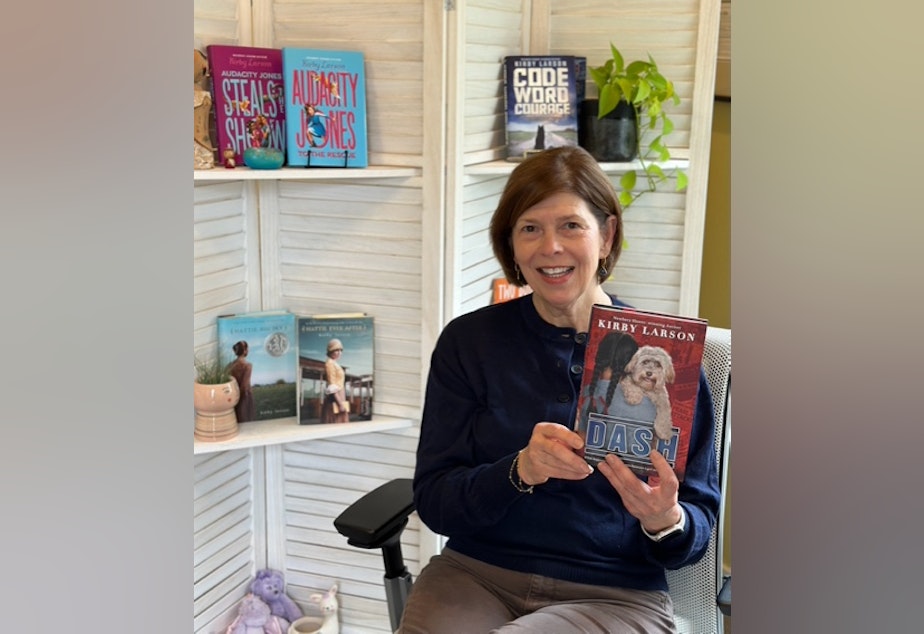Why one Seattle author is seeing her books banned in Florida

Washington author Kirby Larson has been writing children’s books for nearly three decades.
In 2022, for the first time, one of Larson’s books was banned. Her 2014 novel "Dash" was removed from classrooms in Duval County, Florida.
It’s an experience that’s becoming increasingly common.
Larson reflected on that fact for Banned Books Week.
A record number of books are being challenged and banned in the United States this year. Books like Toni Morrison's "The Bluest Eye" and Ta-Nehisi Coates’ “Between the World and Me" are among 695 challenged books, according to the American Library Association.
Sponsored
Larson doesn't know exactly why "Dash" has been targeted — she wasn't directly contacted about the challenge nor has she been given an opportunity to defend or explain her work — but she can make an educated guess. "Dash" is part of a 170-book collection called the Essential Voices Classroom Libraries, which was curated to help students have "an understanding and appreciation of themselves as well as others around them." In other words, "Dash" is part of a collection of books featuring diverse people and experiences.
They're the kind of stories that inspired Larson to write in the first place, stories about the United States' lesser-known history.
(You can learn more about that history with KUOW, too. Reporter Natalie Newcomb recently told the story of her pilgrimage to find her honorary uncle at the site of the Minidoka prison camp in Idaho.)
"Typically, those stories revolve around women or children or young girls," she said. "Because, of course, they are not the ones writing the history books."
Sponsored
"Dash" features the story of Mitzi, a young Japanese-American girl inspired by a real woman who was one of thousands removed from their homes and sent to prison camps during World War II. Mitzi, like the real person she's based on, has to leave behind her beloved dog, the titular Dash.
"I couldn't imagine leaving everything behind and then, salt in the wound, you'd have to leave your beloved four-legged best friend behind as well," Larson said. "So, that just got me thinking about what it would have been like to have been a young girl during that time period."
The story represents more than one person's experience, though.
For Larson, and the relatives of people sent to the incarceration camps, it represents a shameful time in U.S. history that ought not to be repeated.
"I don't believe we want to keep treat treating fellow human beings the way we treated people during World War II here at home," she said. "It's important to tell those stories to remind us of choices that were made in the past and guide us not to make those same cruel choices in the future."
Sponsored
That means educating students about those choices early and throughout their education.
Larson recalled learning how the topic had been left out of her own education in Washington state. She said she felt "betrayed" by the adults in her life.
"This powerful thing that happened, really, in my own backyard had been kept from me," she said. "As a kid, we really do rely on the adults in our lives to tell us the truth, because there's so much to process and so much to figure out. I was really disappointed that I hadn't been told the truth."
And while Larson believes parents are entitled to guide their children and what they read, she wished children had the freedom to read whatever they want and make their own judgements about the world around them.
Sponsored
She knows just how formative that freedom can be.
Larson shared a memory from the third grade, when she went to the library with her father and found a copy of "Gulliver's Travels" by Jonathan Swift.
"It had this great cover, so I really wanted to check it out. I picked it up, and I walked up to the desk. Well, the librarian told me no, I couldn't check it out, because it wasn't a children's book," she said.
But her father wasn't having any of that. He checked it out on his card instead.
"And then tossed it to me in the car," Larson said with a laugh. "Now, I was 8 years old. I did not understand that book. But the message I got was that I could read anything, I could try to read anything I wanted to read. And that was okay."






